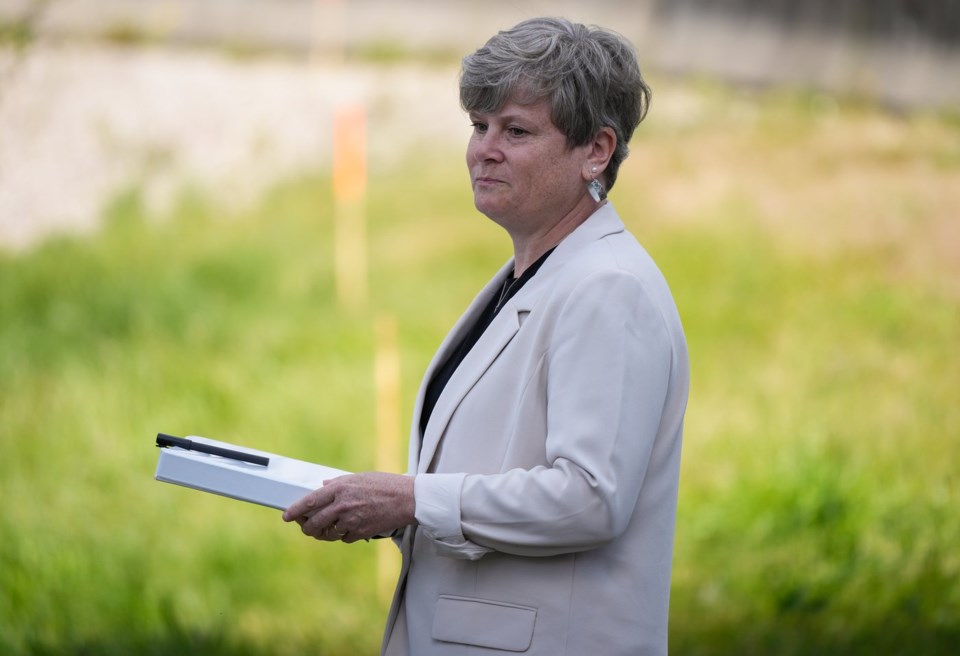The British Columbia government has created 18 new beds dedicated to long-term involuntary care at a Metro Vancouver mental health facility.
The new beds at Alouette Homes in Maple Ridge, B.C., are designed for people who need involuntary care under the Mental Health Act outside the criminal justice system, Health Minister Josie Osborne told a news conference on Tuesday.
"I want to be clear that while Alouette Homes is located next to Alouettes Correctional Centre, it is not the same as the involuntary care beds that were opened last month at the Surrey Pretrial Services Center," Osborne said.
"Those were beds designed specifically for individuals in custody, but Alouette Homes is different. It's for people living with complex mental health disorders who need long-term therapeutic care in a supportive home-like environment."
Osborne said only those certified for long-term involuntary care are eligible to be placed into the new beds.
Dr. Daniel Vigo, B.C.'s chief scientific adviser for psychiatry, toxic drugs and concurrent disorders, said the care offered by Alouette Homes will be the first of its kind in the province.
Vigo said the beds provide an alternative to the current setup, where patients are "stuck in high-security hospital units indeterminately" because of a lack of options.
When asked about how long a patient may stay in long-term involuntary care, Vigo said the time period is "indeterminate."
"It takes as long as it takes for us to help that person," he said.
"This is an approved home, meaning that it is a housing facility that will provide this service in an open-ended manner."
The first people to use the new beds will move in as early as next week, Osborne said.
The move comes after the province announced the opening of a 10-unit involuntary-care facility for people with addiction and mental health issues at the Surrey Pretrial Centre in April.
The Surrey facility is meant to treat people in custody who have a combination of mental health challenges, brain injuries and addiction concerns.
B.C. Premier David Eby said at the time that the unit was meant to stop people continually cycling through the justice system without getting better.
The topic of involuntary care for those suffering from drug addiction, mental illness and brain injuries has been contentiously debated due to its links to both the ongoing toxic drug crisis and public safety concerns.
In addition to B.C., Ontario is also pursuing expanded involuntary treatment while Alberta has introduced legislation that would allow family members, health workers and police to apply to order someone into addictions treatment.
On Wednesday, the federal health minister, Marjorie Michel, said there is no evidence that forcing people into treatment is effective.
But Michel did not weigh in on whether provinces should purse such policies, saying every Canadian has the right to get treatment for addiction.
Osborne said the B.C. government was reviewing the Mental Health Act to identify possible service gaps and potential solutions.
Bonnie Wilson, a vice president with Vancouver Coastal Health, said, referrals would be considered for patients from outside the region to use the new beds.
While Wilson could not share specific details about the patients who would be eligible for long-term involuntary care, she provided a "composite" of characteristics that would likely qualify.
"Just think about a young individual who has been struggling with mental health for a number of years," Wilson said. "During his final exams, he began to hear voices in his head encouraging him to end his life. After a suicide attempt, he had his first extended stay in hospital at the age of 19.
"Between then and now, he went through many, many parts of our health-care system and also, like many people with mental illness, started to self-medicate with street drugs," she said.
Wilson said the new beds would provide such a patient with "an opportunity to be in a more natural environment" after years spent in and out of hospital.
— With files from Sarah Ritchie in Ottawa
This report by The Canadian Press was first published June 3, 2025.
Chuck Chiang, The Canadian Press




